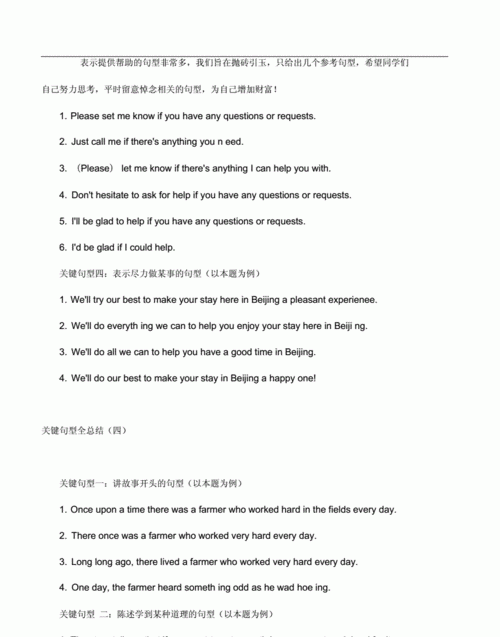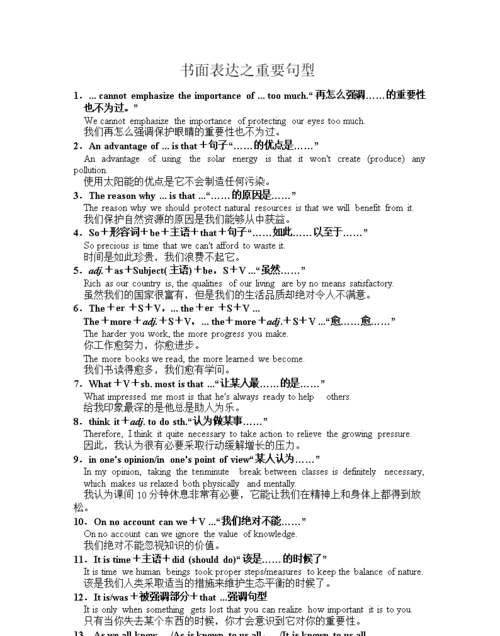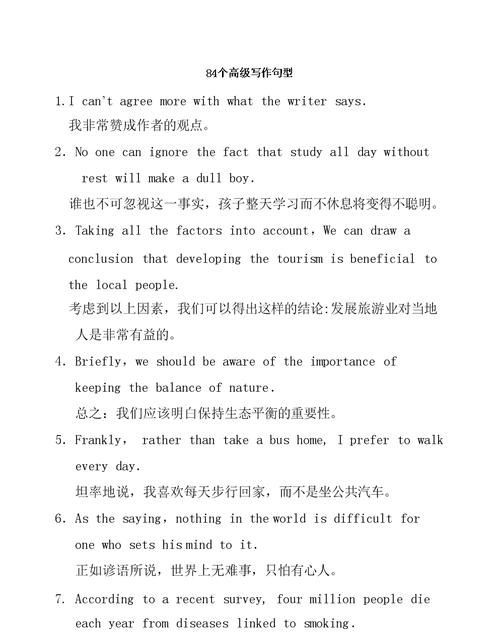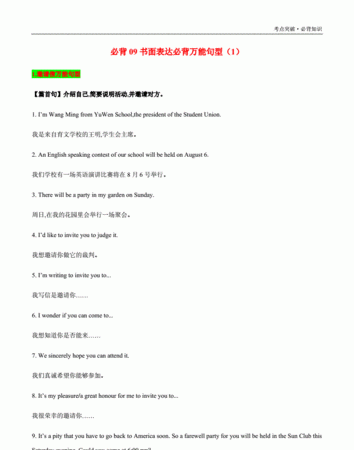本文目录
英语作文句型
英语作文句型
一、开头句型
1.As far as …is concerned 就……而言
2.It goes without saying that… 不言而喻,…
3.It can be said with certainty that… 可以肯定地说……
4.As the proverb says, 正如谚语所说的,
5.It has to be noticed that… 它必须注意到,…
6.It's generally recognized that… 它普遍认为…
7.It's likely that … 这可能是因为…
8.It's hardly that… 这是很难的……
9.It's hardly too much to say that… 它几乎没有太多的说…
10.What calls for special attention is that…需要特别注意的是
11.There's no denying the fact that…毫无疑问,无可否认
12.Nothing is more important than the fact that… 没有什么比这更重要的是…
13.what's far more important is that… 更重要的是…
二、衔接句型
1.A case in point is … 一个典型的例子是…
2.As is often the case…由于通常情况下…
3.As stated in the previous paragraph 如前段所述
4.But the problem is not so simple.Therefore 然而问题并非如此简单,所以……
5.But it's a pity that… 但遗憾的是…
6.For all that…对于这一切…… In spite of the fact that…尽管事实……
7.Further, we hold opinion that… 此外,我们坚持认为,…
8.However , the difficulty lies in…然而,困难在于…
9.Similarly, we should pay attention to… 同样,我们要注意…
10.not(that)…but(that)…不是,而是
11.In view of the present station.鉴于目前形势
12.As has been mentioned above…正如上面所提到的…
13.In this respect, we may as well (say) 从这个角度上我们可以说
14.However, we have to look at the other side of the coin, that is… 然而我们还得看到事物的另一方面,即 …
三、结尾句型
1.I will conclude by saying… 最后我要说…
2.Therefore, we have the reason to believe that…因此,我们有理由相信…
3.All things considered,总而言之 It may be safely said that…它可以有把握地说……
4.Therefore, in my opinion, it's more advisable…因此,在我看来,更可取的是…
5.From what has been discussed above, we may safely draw the conclusion that…通过以上讨论,我们可以得出结论…
6.The data/statistics/figures lead us to the conclusion that…通过数据我们得到的结论是,…
7.It can be concluded from the discussion that…从中我们可以得出这样的结论
8.From my point of view, it would be better if…在我看来……也许更好
四、举例句型
1.Let's take…to illustrate this.
2.let's take the above chart as an example to illustrate this.
3.Here is one more example.
4.Take … for example.
5.The same is true of…
6.This offers a typical instance of…
7.We may quote a common example of…8.Just think of…
五、常用于引言段的句型
1.Some people think that … 有些人认为…To be frank, I can not agree with their opinion for the reasons below.坦率地说,我不能同意他们的意见,理由如下。
2.For years, … has been seen as …, but things are quite different now.多年来,……一直被视为……,但今天的情况有很大的不同。
3.I believe the title statement is valid because… 我认为这个论点是正确的,因为…
4.I cannot entirely agree with the idea that …我无法完全同意这一观点的… I believe…
5.My argument for this view goes as follows.我对这个问题的看法如下。
6.Along with the development of…, more and more…随着……的发展,越来越多…
7.There is a long-running debate as to whether…有一个长期运行的辩论,是否…
8.It is commonly/generally/widely/ believed /held/accepted/recognized that…它通常是认为…
9.As far as I am concerned, I completely agree with the former/ the latter.就我而言,我完全同意前者/后者。
10.Before giving my opinion, I think it is essential to look at the argument of both sides.在给出我的观点之前,我想有必要看看双方的论据。
六、表示比较和对比的常用句型和表达法
1.A is completely / totally / entirely different from B.
2.A and B are different in some/every way / respect / aspect.
3.A and B differ in…
4.A differs from B in…
5.The difference between A and B is/lies in/exists in…
6.Compared with/In contrast to/Unlike A, B…
7.A…, on the other hand,/in contrast,/while/whereas B…
8.While it is generally believed that A …, I believe B…
9.Despite their similarities, A and B are also different.
10.Both A and B … However, A…; on the other hand, B…
11.The most striking difference is that A…, while B…
七、演绎法常用的句型
1.There are several reasons for…, but in general, they come down to three major ones.有几个原因……,但一般,他们可以归结为三个主要的。
2.There are many factors that may account for…, but the following are the most typical ones.有许多因素可能占…,但以下是最典型的。
3.Many ways can contribute to solving this problem, but the following ones may be most effective.有很多方法可以解决这个问题,但下面的可能是最有效的。
4.Generally, the advantages can be listed as follows.一般来说,这些优势可以列举如下。
5.The reasons are as follows.
八、因果推理法常用句型
1.Because/Since we read the book, we have learned a lot.
2.If we read the book, we would learn a lot.
3.We read the book; as a result / therefore / thus / hence / consequently / for this reason / because of this, we've learned a lot.
4.As a result of /Because of/Due to/Owing to reading the book, we've learned a lot.由于阅读这本书,我们已经学到了很多。
5.The cause of/reason for/overweight is eating too much.
6.Overweight is caused by/due to/because of eating too much.
7.The effect/consequence/result of eating too much is overweight.
8.Eating too much causes/results in/leads to overweight. 吃太多导致超重。

高中英语概要写作常用句型
一篇文章通常可分为三个部分,即开头、正文和结尾。这三个部分安排是否得体,直接影响到文章的质量。
文章的开头一般来说应尽量做到开门见山,用简单明白的叙述引出文章的话题,使读者了解文章要谈论什么,一下于引起读者的兴趣。
作文常见的开头形式大致有以下几种:
1.开门见山,揭示主题
文章一开头,,就交待清楚文章的主题是什么。如“How I Spent My Vacation”(我怎样度假)的开头可以写成:
I Spent my last vacation happily.
"Honesty"(谈诚实)的开头可以写成:
Honesty is one of the best virtues.An honest man is always trusted and respected.On the contrary, one who tells lies is regarded as a "liar",and is looked upon by honest people.
2.交代人物、事情、时间或环境开头
在文章的开头,先把人物、事件和环境交待清楚。例如"A Trip to Jinshan" (去金山旅游)的开头可以写成:
The day before yesterday my class went on a bus trip to Jinshan. The bus ride there took three hours. The long trip made us very tired, but the sight of the beautiful sea refreshed us.
3. 回忆性的开头
用回忆的方法来开头。例如"A Trip to the Taishan Mountain"(泰山游)的开头是:
I remember my first trip to the Taishan Mountain as if it were yesterday.
4.概括性的开头
即对要在文章中叙述的人或事先作一个概括性的介绍。如“The Happiness of Reading Books”(读书的快乐)的开头:
People often say that gold and silver are the most valuable things in the world. But I say that to read books is more valuable than anything else, because books give us knowledge and knowledge gives us power.
5.介绍环境式的开头
即开头利用自然景物或自然环境引出要介绍的事物。如“An Accident”(一场事故)的开头可以写成:
It was a rainy and windy morning. The sky was gloomy, the temperature was low, and the street was nearly empty. I was on my way back to school. Suddenly, a speeding car came round the corner.
6.交待写作目的的开头
在文章的一开头就交待写作目的,如通过文章要表扬谁,批评谁,或说明一个什么问题等。如 "Pollution Control" (控制污染)的开头:
In this article I shall draw your attention to the subject of pollution control.
1.结尾万能公式一:如此结论
说完了,毕竟要归纳一番,相信各位都有这样的经历,领导长篇大论,到最后终于冒出个“总而言之”之类的话,我们马上停止开小差,等待领导说结束语。也就是说,开头很好,也必然要有一个精彩的结尾,让读者眼前一亮,这样,你就可以拿高分了!比如下面的例子: obviously(此为过渡短语), we can draw the conclusion that good manners arise from politeness and respect for others. 如果读者很难“显而见之”,但说无妨,就当读者的眼光太浅罢了!
更多过渡短语: to sum up, in conclusion, in brief, on account of this, thus
更多句型: thus, it can be concluded that……, therefore, we can find that…
2.结尾万能公式二:如此建议
如果说“如此结论”是结尾最没用的废话,那么“如此建议”应该是最有价值的废话了,因为这里虽然也是废话,但是却用了一个很经典的虚拟语气的句型。 obviously, it is high time that we took some measures to solve the problem. 这里的虚拟语气用得很经典,因为考官本来经常考这个句型,而如果我们自己写出来,你说考官会怎么想呢?
更多句型: accordingly, i recommend that some measures be taken. consequently, to solve the problem, some measures should be taken.

中考英语作文句型
57个中考必备句型
1 as soon as
2 as…as
3 as…as possible
4 ask sb. for sth.
5 ask/tell sb. (how) to do sth.
6 ask/tell sb. (not) to do sth.
7 be afraid of doing/that
8 be busy doing sth.
9 be famous/late/ready/sorry for…
10 be glad that
11 buy/give/show/bring/lend/send/pass/tell…sth. to sb.
12 buy/give/show/bring/lend/send/pass/tell sb. sth.
13 either…or
14 enjoy/hate/like/finish/stop/mind/keep/go on doing sth.
15 find it + adj to do sth.
16 get + 比较级
17 get ready for/get sth. ready
18 had better (not) do sth.
19 help sb. (to) do/help sb.with
20 I don’t think that
21 I would like to /Would you like to…?
22 is one of the + 最高级 + n(pl.)…
23 It is +adj. for sb. to do sth.
24 It is a good idea to do sth.
25 It is the second + 最高级 +n.
26 It looks like …/It sounds like …
27 It seems to sb. that…
28 It sounds +adj. /It looks +adj.
29 It takes sb some time. to do sth.
30 It’s bad/good for…
31 It’s time for…/to do sth.
32 It’s two meters (years) long (high, old).
33 keep sb. doing
34 keep/make sth. +adj.
35 like to do / like doing
36 make / let sb.(not) do sth.
37 neither…nor
38 not…at all
39 not…until
40 One…the other…/Some… others…
41 prefer…to
42 see/hear sb. do(doing) sth.
43 so…that
44 spend…on /(in) doing sth.
45 stop to do /stop doing
46 such a +adj. +n. that…
47 take/bring sth with sb.
48 thank sb for sth.
49 The more…the better
50 There is sth. wrong with…
51 too…to
52 used to
53 What about /How about…?
54 What’s the matter with…?
55 What’s wrong…?
56 Why not…?
57 Will (would, could) you please…?
把这些重点句型用到作文中,一定能增色不少
还有,要多背课文,它是知识的精华,加油吧

高中英语作文常用句型
一、以形式主语it引导的句型。
句型1.
It (so) happened(chanced) that +clause. = sb. happened /chanced to do sth. =sb.did sth. by chance. 如:
It happened that he was out when I got there. 当我到那儿时,碰巧他不在。=He happened to be out when I got there.= It chanced that he was out when I got there= He was out by chance when I got there.
句型2.
It seems that sb. do/ be doing/ have done/ had dOne= Sb. seems to do/ be doing/ have done/to be done/to have been done(还有动词appear等可这样使用)如:
It seemed that he had been to Beijing before.他好象以前去过北京。=He seemed to have been to Beijing before.
句型3.
It is / was+被强调的部分+that(who)+剩余的部分.如:
It wasn't until he came back that I went to bed.直到他回来我才睡觉。(一定要注意被强调句型中的谓语动词否定的转移)。 It was because he was ill that he didn't come to school today.只因为他有病了今天没有来上学。(只能用because而不能用for, as 或since)
It is I who am a student. 我确实是个学生。(句中am不能用are来代替。)
句型4.
It is high time (time/ about time)+ (that) 主语+should do / did+其它。(从句中的谓语动词用的是虚拟语气。)如:
It is high time that we should go / went home.我们该回家了。
句型5.
It is / was said ( reported…)+that+从句. 如:
It was said that he had read this novel.据说他读过这篇小说。=He was said to have read this novel.
句型6.
It is impossible / necessary/ strange…that clause.(从句中的谓语用should+do / should have done,其形式是虚拟语气。)如:
It is strange that he should have failed in this exam.真奇怪,他这次考试没有及格。
句型7.
It is + a pity/ a shame…that clause.(注意从句中的谓语动词用should do或should have done的形式,但should可以省略。)如:
He didn't come back until the film ended. It was a pity that he should have missed this film. 他直到电影结束才回来。他没有看到这部电影真可惜。
句型8.
It is suggested / ordered/ commanded /…that +clause.(从句的谓语动词用should do, 但should可以省略。)如:
It is suggested that the meeting should be put off.有人建议推迟会议。
句型9.
It is/was+表示地点的名词+where+从句。(注意本句不是强调句型,而是以where引导的定语从句。)如:
It was this house where I was born.请比较:It was in this house that I was born.(后一句是强调句型。)
句型10.
It is / was +表示时间的名词+when+从句。(注意本句型也不是强调句型,而是以when引导的定语从句。)如:
It was 1999 when he came back from the United States. 请比较:It was in 1999 that he came back from the United States.
句型11.
It is well-known that+从句。如:
It is well-known that she is a learned woman.众所周知,她是个知识渊博的妇女。
句型12.
It is +段时间+since+主语+did. 请比较:
It was +段时间+since+主语+had done. 如:
It is five years since he left here.他已经离开这儿五年了。
It was five years since he left here.(同上)
注意下列句型的翻译:It is five years since he lived here.他从这儿搬走已经有五年了。
句型13.
It +谓语+段时间+before+主语+谓语.( before引导的是时间状语从句。) 如:
It wasn't long before the people in that country rose up.没有多久那个国家的人民就起义了。
It will be three hours before he comes back.三个小时之后他才能回来。
句型14.
It is +形容词(possible, impossible, necessary等) +for+ sb.+ to do. 如:
It is impossible for me to finish this work before tomorrow.我明天之前完成此工作是不可能的。
句型15.
It is +(心理品质方面的)形容词+of + sb. +to do.= 主语+ be +形容词+to do.(常用的形容词有:kind, stupid; foolish, good, wise等。)如:
It is kind of you to help me.=You are kind to help me.你真好给我提供了帮助。
二、定语从句:
句型16.
由as引导的非限定性的定语从句。如:
As we have known, he is a most good student.众所周知,他是个很好的学生。请比较:It is well-known that he is a most good student.(前一个是定语从句,而后者是个主语从句。)
句型17.
由which引导的非限定性的定语从句。如:
He is a professor, which I have been looking forward to becoming. 他是个教授,那是我一直盼望的职业。(因为先行词professor是表示职业的名词,因此引导词用which,而不用who。
句型18.
由where, when引导的定语从句(其中包括限定性的或非限定性的。)如:
This is the house where I used to come.请比较:This is the house which / that I used to come to.
This is the day when I joined the Party.请比较:This is the day which / that I joined the Party on.
(说明:关于that与which之间的区别,请看关系代词that和which的区别。)
三、让步状语从句
句型19.
No matter what / which / who / where / when / whose+从句,+主句.(注意从句中的时态一般情况下用一般现在时态。)如:
No matter what you do, you must do it well.请比较:Whatever you do, you must do it well. 无论你做什么,一定要做好。
No matter where you go, please let me know.请比较:Wherever you go, please let me know.你无论去哪儿,请通知我。
(说明:这两种句型形式不同,而意义完全相同。)
(注意:I will tell whoever would like to read it. 句中的whoever不能用whomever来代替。因为它即作动词tell的宾语,又作后面从句的主语。)
四、条件状语从句
句型20.
When / So long as / As long as / Once +从句,+主句。(从句也可以放在主句之后。)如:
As long as you give me any money, I will let you go.只要你给我一些钱,我就让你走。
Once you have begun to learn English, you should learn it well. 一旦你开始学习英语,你应该把它学好。
句型21.
主句+on condition that+从句.如:
I will go with you on condition that you give me a sum of money.我和你一起去的条件是你给我一些钱。
句型22.
主句+unless+从句.(注意:由于unless本身是否定词,所引导的从句的谓语动词用肯定而不用否定。)如:
I will go there tomorrow unless it rains.我明天去那儿除非下雨。
句型23.
祈使句,+and/ and then+主句。(注意:祈使句也可用一个名词短语。)如:
Use your head, and you will find a good idea.动脑筋想一想,你就会想出一个好主意。
Another word, and I will beat you.你再说一句,我就揍你。
句型24.
If +necessary / impossible/ important等,+主句.(注意:if与形容词之间的it is被省略。)如:
If necessary, I will do it. 如果有必要的话,我来做此事。
五、原因状语从句
句型25.
主句+in case+从句.(in case表示以免)如:
I will take my raincoat in case it rains.我要把雨衣带上以免下雨。
句型26.
主句+due to / because of / owning to / + the fact that +从句。如:
He did not come to school because of the fact that he was ill.由于他有病了,所以没有来上学。
六、时间状语从句
句型27.
When / While / As +从句,+主句.如:
When I was in the country, I used to carry some water for you.当我在农村时,我常常给你打水。
句型28.
主句+after / before +从句. 如:
They hadn't been married four months before they were devoiced.他们结婚不到四个月就离婚了。
We went home after we had finished the work.我们做完此工作就回家了。
句型29.
主语+肯定谓语+until+从句.请比较:主语+否定谓语+until+从句.如:
I worked until he came back.我一直工作到他回来。
I didn't worked until he came back.他回来我才开始工作。
句型30.
As soon as / Immediately / Directly / Instantly / The moment / The instant / The minute +从句,+主句. 如:
My father went out immediately I got home.我一到家,我父亲就出去了。
句型31.
No sooner +had + 主语+done…than +主语+did. 请比较: 主语+had + no sooner +done…than +主语+did. 如:
No sooner had I got to Beijing than I called you.我一到北京就给你打电话了。请比较:I had no sooner got to Beijing than I called you.
句型32.
Hardly/Scarcely/ Rarely +had +主语+done…when / before + 主语+did.请比较:主语+had +hardly/Scarcely/ Rarely + done…when / before +主语+did.
Hardly had she had supper when she went out. 她一吃完晚饭就出去了。请
比较: She had hardly had supper when she went out.
句型33.
By the time+从句,+主句.(注意时态的变化。)如:
By the time you came back, I had finished this book.到你回来时,我已经写完了这本书。
By the time you come back, I will have finished this book.到你回来时,我将写完这本书了。
句型34.
each / every time +从句,+主句. (这时相当于whenever 或no matter when引导的从句。从句也可放在主句之后。)如:
Each time he comes to Harbin, he always drops in on me.每当他来哈尔滨,总是顺便来看看我。
七、地点状语从句
句型35.
Where +从句,+主句. 如:
Where there is no rain, farming is difficult or impossible.哪里没有雨水,种庄稼是很难的或者是不可能的。
句型36、Anywhere / Wherever+从句,+主句. 如:
Anywhere I go, my wife goes too.无论我去哪儿,我的妻子也去哪儿。请比较:
I will go wherever you suggest.你建议我去哪儿,我就去哪儿。
八、目的状语从句
句型37.
主句+in order that / so that +从句.如:
I got up early in order that I could catch the first bus.我起得很早,以便能赶上早班车。
句型38.
主句+for +sb. +to do.(注意动词不定式复合结构在这儿作目的状语。)如:
He came here for me to work out this problem.他来这儿叫我帮他解出这道难题。
九、结果状语从句
句型39.
主句+so that+从句. 如:
It was very cold, so that the river froze.天气很泠,因此河水结冰了。
句型40.
So+形容词/ 副词+特定动词(助动词或系动词)+主语+…+that+从句.
So interesting is this book that I would like to read it again.这本书那么有趣,我想再读一遍。
句型41.
主语+谓语+such+名词+that+从句.如:
He made such rapid progress that he was praised by the teacher.他进步很快,老师表扬了他。
句型42.
Such was + 主语+that +从句.(这是个完全倒装句。)如:
Such was the force of the explosion that all the windows were broken.爆炸力这么大,所有的窗户都被震碎了。
句型43.
主句+only +to do sth. (only和动词不定式一起做结果状语)如:
I woke up very late only to find that my wife had gone to work. 我醒得很晚,结果发现我的妻子已经上班了。
十、比较状语从句
句型44.
The +形容词比较级……,(主句)the +形容词比较级+……如:
The sooner you do it, the better it will be.越早越好。
句型45.
主语+谓语+as +形容词原级+as +被比较的对象. 如:
He is as busy as a bee.他非常忙。
句型46.
主语+谓语+the+形容词比较级+of / between …
He is the taller of the two.他们俩人中他高。
句型47.
主语+谓语+倍数+as+形容词原级+as+被比较的对象.如:
This room is three times as large as that one.这个房间是那个房间的三倍大。(这个房间比那个房间大两倍。)
句型48.
主语+谓语+百分数/倍数+形容词比较级+than+被比较的对象.如:
This city is twice larger than ours.这个城市比我们城市大两倍。
The early rice output in that commune was 200% more than that of 2001.那个公社的早稻产量是2001年的两倍。
句型49.
主语+谓语+the size / length/ width/ height +of +被比较的对象.如:
Our building is twice the height of yours.我们的大楼是你们大楼的两倍高。
十一、其它句型
句型50.
It doesn't matter wh-+从句。如:
It doesn't matter to me what you will do tomorrow.你明天做什么与我无关。
It doesn't matter whether you will come or not.你来不来无关紧要。
句型51.
形容词/ 副词 / 名词(可数单数)+as / though +主语+谓语,+主句.如:
Young as he is, he knows a lot.虽然他很小,但他知道得很多。
Hard he works, I am sure that he can't pass this exam.虽然他学习很努力,这次考试他肯定不能及格。
Child as he is, he knows a lot.虽然他是个孩子,但他懂得很多。
句型52.
Were / Should / Had +主语+谓语,+主句.如
Were I you, I would have gone there yesterday.如果我是你的话,昨天我就去那儿了。
句型53
Only +状语+特定动词+主语+谓语…
Only by this means can I do this work well.只有用那种方式我才能做好此工作。
Only because he was ill did he not come to school.只因为他有病了才没有来上学。
Only then did I realize that I had been wrong.只有那时,我才认识到我错了。
句型54
Not only +特定动词+主语+谓语…but also+主语+谓语… 如:
Not only did he learned English well but also he spoke French very well. 他不但英语学得好,而且法语讲得很流利。
句型55
whether…or…, neither…nor…, either…or… 如:
Whether he will come or not isn't important.他不来不重要。
句型56
主语+doubt+whether + 从句. 请比较: 主语+特定否定词+doubt+that+从句. 如:
I don't doubt that he will come this afternoon.我确信他下午一定能来。

以上就是关于书面表达句型50个 ,英语作文句型的全部内容,以及书面表达句型50个 的相关内容,希望能够帮到您。
